Leading up to the NCAA Tournament matches, VolleyMob is sitting down for a brief conversation with the head coach of each of the seven remaining teams for a quick update on their season, their personnel and their outlook heading into the final matches of 2018.
UCLA coach John Speraw shared about how much it would mean to him to bring a national championship back to his alma mater, the amazing players across the NCAA field and his team’s constantly evolving offensive journey in 2018.
The 24-7 Bruins come into the NCAAs after falling to BYU in the MPSF Tournament championship game. UCLA has wins over three other members of the tournament field in BYU (3-0 in MPSF regular season finale), UC Irvine (3-1 on Feb. 3 and 3-2 on Jan. 10) and Ohio State (3-2 on Jan. 20).
The Bruins are making their second NCAA appearance in the last three years after falling to Ohio State in the 2016 Final Four and will play any remaining matches in the friendly confines of their home arena, Pauley Pavilion.
You have the good fortune of playing at home throughout should you make it to the final. What are the advantages and disadvantages of playing at home?
It is a different experience certainly. The advantage for us is that we have been better at home. That is on a year by year basis, because sometimes you have a team that is pretty good on the road, sometimes you are better at home. This year, for whatever reason, we have been better at home, so I think that is good for us… I think it is a different experience in championships when you are sleeping in your own bed and walking over to campus like any other match, so we will have to manage that and see how we do, but it will be a good experience for our guys.
On the season you are averaging more than 1,000 fans per match. I would assume with the other local teams, you are expecting a much larger crowd.
Oh yeah. I think there are some matchups here that people are really interested in. We had 5,000 the when we hosted BYU the last time we were here.
If we can work our way past Harvard, which I know from a seeding perspective, people were probably surprised that Harvard was here, but in evaluating them and taking a look at them for the first time this season, that team can pass and they have some players that can play the whole game. They are running a 6-2, which is what we have done the previous two years, and I was pretty impressed with their ball control skills. So, in this conversation as we are talking about different potential matchups, by no means am I looking over Harvard. I think they are a deserving Final Four candidate and NCAA candidate.
But, if you are looking at potential matchups down the road, BYU travels well and when we played at Long Beach this year, there were 4,500 people there. It was a sellout, it was the largest crowd they have ever had.
People are interested in seeing some of these athletes that are currently playing the game. I think there are some historically unique players right now, whether the is (Nicolas) Szerszen for Ohio State and the run that they have had over the last couple of years and what he has meant to that program. Then you’ve got TJ DeFalco and Josh (Tuaniga) and Kyle (Ensing) at Long Beach and the skill level that they bring is really unique. And then you have some great young players at BYU and Brenden Sander. And then of course for us you have Micah (Ma’a) and Kofi. You have some real elite athletes on the floor, who are maybe getting more elite in terms of skill level and athleticism. The skill level that some of these players are bringing and the volleyball IQ that they are bringing because a lot of second generation players are playing the game now. And in Kofi’s case, nobody is touching 12-foot-4.
There are some matchups that people want to see and I think they are going to come out.
How special would it be to add another title and to do it at home?
The last time we hosted was 2013, that was my first season here and we pretty close to getting here but we lost in the regional semifinal. If we had won that, we probably would have been in it. We were up 2-0 on BYU at BYU actually. Then Irvine, where I had just left, returned everybody and they came and won it here. Then, previous to that was in 2005, when they lost to Pepperdine in the final in Pauley (Pavilion). The last time we won it was in 2006 at Penn State.
I think anytime you are playing at UCLA, you are very aware of the tradition and the history of greatness. But, this is this year’s team. Teams from the past are going to support us, but they aren’t going to win it for us. These guys know that they’ve got to go out and do the work. We are the three seed coming in and I think that is probably where we belong. We are playing at home, but we are not the favorites, so we are just going to take one match at a time and hopefully win them and see where that takes us.
What have you been doing in practice this week with the weekend off? Has it been more focused on your team or on Harvard?
We mostly this season have spent time on us. I think there are just some things about the way we are playing the game and the style of play that we have had this year that has needed more refinement than other teams. What I mean by that is the last couple of years, we have been playing with a different offensive system, using a 6-2 with Hagen (Smith) and Micah. Now we are running a 5-1 and Christian Hessenauer is getting back on the court for the first time in a few years. We had some changes at outside hitter and who is going to play libero.
I feel like I have spent a lot more time this season refining offense than I would guess other teams have spent. BYU is returning a multiple year setter, obviously the Long Beach crew has been together for a while. I know Ohio State had some changes, but they are bringing back their two primary outsides. They have probably had a lot of this conversation, but their system hasn’t changed.
I think for us, I feel like , gosh, we just have had to get better at what we are doing and this last week was no different. We are not a polished team, we are an athletic team, but we are not yet totally refined. I am going to go into practice today and see if we can get better at some of our routes and our system and continue to get better at it. I am hoping we can pull this off, just in the nick of time.
Speaking of that, I know you are scouting everyone due to the short turnaround time. But first you have Harvard. You mentioned their passing earlier. What do you see in them that is going to challenge your team?
I think when you play a team that runs a 6-2, you have to be very aware of how effective transition can be. When you have two setters on the court, instead of one, it makes a tremendous difference in transition and busted players because the percentage of time that someone is setting a good ball increases. You have to be real disciplined with your transition game, particularly defensive transition and you have to keep track of different distributions and different tendencies of each setter, who’s front row and who’s back row, so I think there are some things you have to be really aware of and understand that it is not going to be perfect because you just don’t play against that system very often. Hopefully we will be a little bit more familiar with that system because we ran it.
They have got some really good ball control players. Obviously they have setters that can also hit. They have some good outside hitters. I was pretty impressed with how much they set the middle of the court. I don’t know. I think we have our hands full.
When you look at the rest of the possible scenarios, should you get past Harvard… Does it help that you have played all of your potential opponents?
I think in terms of scouting, there is a high degree of familiarity with all of the other potential opponents. We haven’t seen Ohio State, Irvine, and Long Beach for quite some time, but we just played BYU two weeks ago. So, as you are looking and preparing game plans, it is certainly helpful for the guys visually to understand the different styles and systems of play.
Obviously if you win, you have a rematch with BYU, which would be your fourth meeting this season. How do you keep your guys from looking ahead to that match?
I think because we have had some matches in the past where we have done that, hopefully we will have learned our lesson. I don’t know that, but you hope that some of the themes and tough losses and scares over the course of the season instill a level of maturity in your athletes that they know they have to go out and play hard no matter who is on the other side of the net whether they are a team you have faced a few times or a team you don’t know much about. Obviously for us that is the latter.
The hard thing in sport is to go out and play against a team where you are expected to win. For us, we are going to go out and respect the game. I certainly have a high degree of respect for Harvard and what Brian has done there. It is a tremendous achievement for their program. Our guys are going to go out and play as hard as they can.
What are the advantages/disadvantages of how the bracket is set up where it could end up being MPSF vs. MPSF and Big West vs. Big West to get to the final? A point of contention is that it could keep the two best teams from playing. How do you take that?
I certainly took it as the seedings come. I understand that argument, but I think with all of the information the committee has right now, it has made their decision making a lot more complex with the addition of another conference. I don’t even know what you could have done. I think Irvine getting in, especially with us being 2-0 on Irvine, and I know they were 2-0 on BYU, but I am not sure what the committee could have done. BYU was definitely a number 2 seed, and I think as they were looking at seeding, they probably had to put us at 3. So I don’t think they probably had much choice there, but I am not in that room and I don’t know all of the elements of their discussion and it is probably more complex than people think.
Let’s talk personnel. Hessenauer has done the heavy lifting, but you have three other capable guys averaging more than two kills per set, plus the nation’s most efficient hitter. You talked about tweaking that offense consistently. How has the balance carried you through some of those growing pains the season?
The balance, but what has also gotten us through is that we can set Kofi (Daenan Gyimah) a ball and he is going to put it away. He is a uniquely talented individual. I have thought a little bit about it, I haven’t had too much time to spend on it, but he has to be one of the most productive middles of all time, certainly in the rally scoring era. If you look at his ability to kill the ball and then you look at his ability to score aces, and then he is the No. 2 blocker in our league, only .01 behind Price Jarman, you are looking at a guy who is developing an all-around game and he is only a sophomore. It is pretty remarkable. I think the development of his game in conjunction with Micah and the connection that they have and Micah’s understanding of how to utilize someone like that has been a big part of our ability to be successful.
We have mixed around different outside hitter combinations during the course of the year. Jake Arnitz, who is a returning All-American, didn’t start for a chunk of the year, so we do have some depth and versatility and we have utilized that at times. We have made our way through the season, but it hasn’t always been super clean.
I think Hessenauer has done a lot for us this year and I am thrilled for him, because he has obviously been the odd man out in the choice of our 6-2 system the last couple of years. He is making the most of his opportunity and he has just been playing great and hopefully he finishes off his career with a good week.
Your team ranks second nationally in hitting percentage at .350 and also in the top five in kills per set (3rd, 13.02), aces (5th, 1.72) as well as 10th in blocks (2.40). Is there a certain aspect of your game that has been the most important this season to get through some of those trying times?
I think we have been focusing a lot more on offense because it hasn’t been exactly where we have wanted it. There has been constant tweaking there, but at the same time, if you look at the statistics, we really need to block and dig a little bit better and give ourselves some more transition opportunities and capitalize on those opportunities a little bit better. I think that has been another area of focus for us. We are going to have to better in transition this week and our guys know it. When we get our opportunities against great teams, we have to capitalize better than we have done in the past.
What will your biggest challenge be in your quest for a national title?
I think the biggest challenge anytime you come into a tournament like this is can your system, and the establishment of your system be enough to match up against what other teams offer. Meaning that, say you go through all of these matchups, you are going to play Harvard in a 6-2, you are going to play BYU and the way that they play their game, and then you could end up playing Long Beach… or Ohio State or Irvine. You are talking about three very different match and three very different styles of play and you have to do that with just one day of preparation. I think the challenge is for your team to be skilled enough to adapt and be able to manage how to play a different team and different system and style, especially in this tournament. If we were to win, we would play at 7:30 p.m. on Thursday and at 4 on Saturday, so that means you are going in with a really light practice and couple of video sessions and you have to go play a significantly different style of play. So, that adaptation, that ability to process information necessary before going in will be a key element this week.
When you look at your resume, you have been a part of eight national championship teams as a player, assistant and head coach, but you haven’t gotten that national championship ring in your five-year head coaching tenure with the Bruins. What would mean to you to bring that national championship to UCLA?
It would mean everything. Obviously I played here and I owe a lot to UCLA. I can’t even explain. I don’t even know how to express what this institution, this athletics department, and my association with teammates and Al Scates, has made on my life. When I accepted this job, I viewed it as my opportunity to give back to a program that has given me so much. So, for me, I just work hard every day trying to get this program back to where it is competing for and winning national championships. Obviously we are going back to our second NCAA in the last few years and I am proud of that, but to get back to where we are winning these is our goal and certainly it would be really meaningful to me and I think all of the alumni who want to see this program be successful, because it has meant so much to all of us.
It has been an up and down last four years. Is this the end of a four-year progression?
I think it some ways it is. When I got the job, it was really about trying to get recruiting going, right? You spend the first year and you are trying to get all of these seniors that are available. Fortunately, five or six years ago the seniors were still available. So those guys all graduated last year; that was Mitch Stahl and Hagen (Smith) and that crew. That was the first group that we brought in. Then we immediately started bringing in the juniors, Arnitz and Hessenauer were the first two commits from that class. It kind of felt like these last two years are the first era of my coaching career at UCLA because they were all kind of together. They have done a great job, obviously went to a final four a couple of years ago. Last year was unfortunately with all of the injuries we had and now have an opportunity to get back and give it another shot.
I would like to give this group the best sendoff possible. I don’t know what that means because there are some great teams in this tournament and we are grateful to be a part of it. But, this is UCLA and I think the tradition and expectation is to come into this tournament and win championships and that is what we hope to do.
What makes this team special? What should people know about the 2018 Bruins?
I think what we have really done is make a significant commitment to building great team chemistry. I think I am most proud of the fact that guys have done such a good job of committing to one another to building the best team that they can. The chemistry, the relationships, they are all better than they have ever been since I have been here, so I think we are moving the culture in the right direction. I am really pleased with that and I think we are seeing the results of that focus. The guys really stated some clear values for themselves this year and I think they have done a really good job living up to them. I am proud of them for the development and maturity they have developed over the course of this year and I am excited to go out and play the last matches with them. That is what you want is to get to the last week of the year and here we are.
Finally, if your season ends on Tuesday or before winning the championship, would you still consider it a successful year for UCLA men’s volleyball?
I think it was. I think UCLA has won so many championships that the expectation is there that we get back and start winning them, but I think it is a progression to do that. I think if we talk about the man that influenced UCLA culture the most, you are talking about John Wooden and his definition of success was did you do everything you could to make yourself the best you possibly could be. I think the one thing as I look back on this year is how intentionally we have trained over the course of the year. I think every single day we got a little bit better. We had a long, long way to go, and in a lot of ways I think more than most of the teams in this tournament, so for us to get to this place and have an opportunity, I think is a success. I am just hopeful that we can live up to the tradition of UCLA and put this one over the top.
- UCLA Athletics – 2018 UCLA Men’s Volleyball versus Long Beach State University, Pauley Pavillion, UCLA, Los Angeles, CA. February 21st, 2018 Copyright Don Liebig/ASUCLA 180221_MVOL_0052.NEF
- UCLA men’s celebration
- Christian Hessenauer – UCLA men’s volleyball
- Micah Ma’a – UCLA men
- Jake Arnitz – UCLA men’s volleyball
- Daenan Gyimah – UCLA men’s volleyball
- John Speraw – 2018 UCLA Men’s Volleyball versus Long Beach State University, Pauley Pavillion, UCLA, Los Angeles, CA. February 21st, 2018 Copyright Don Liebig/ASUCLA 180221_MVOL_0170.NEF
- UCLA men – block
- UCLA Athletics – 2018 UCLA Men’s Volleyball versus Penn State University, Pauley Pavillion, UCLA, Los Angeles, CA. January 18th 2018 Copyright Don Liebig/ASUCLA 180118_MVOL_450.NEF
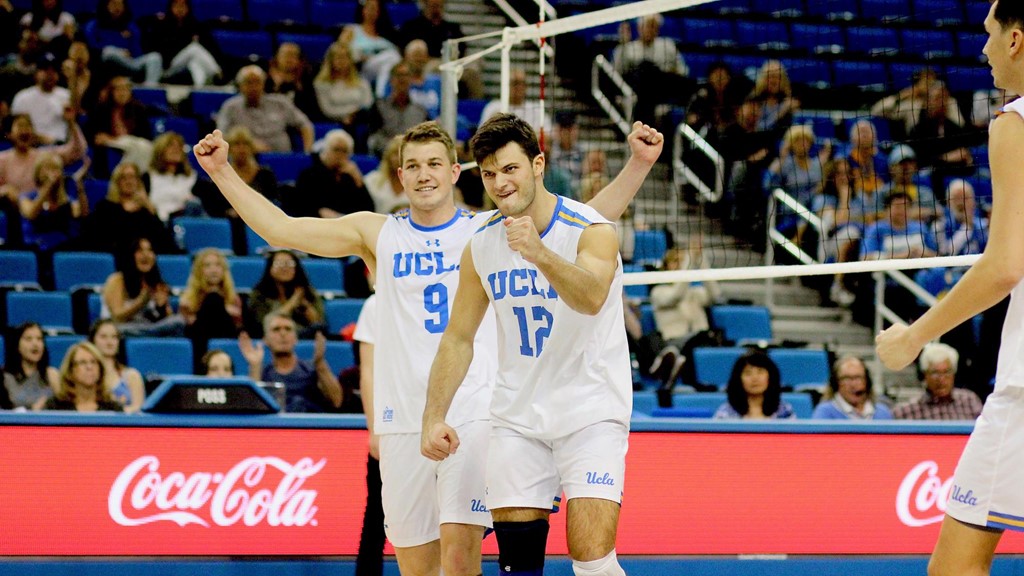
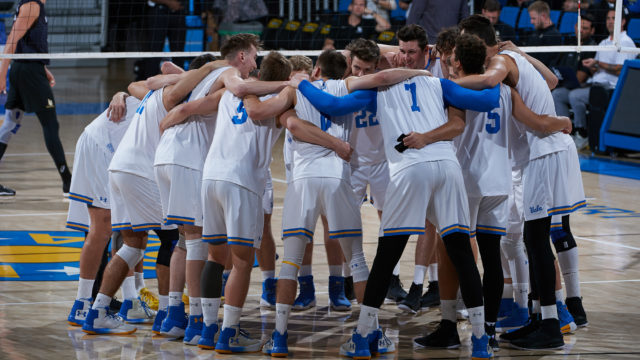
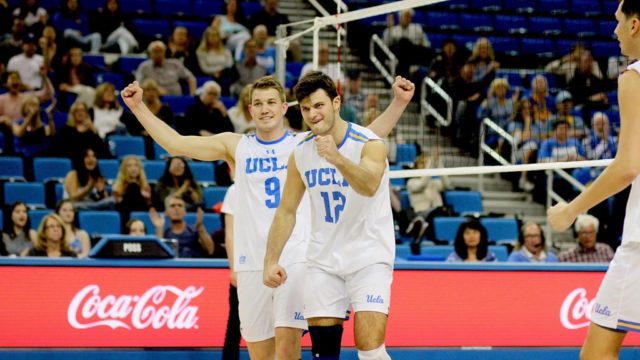
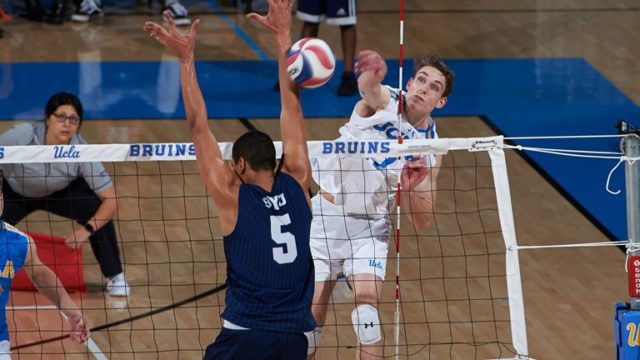
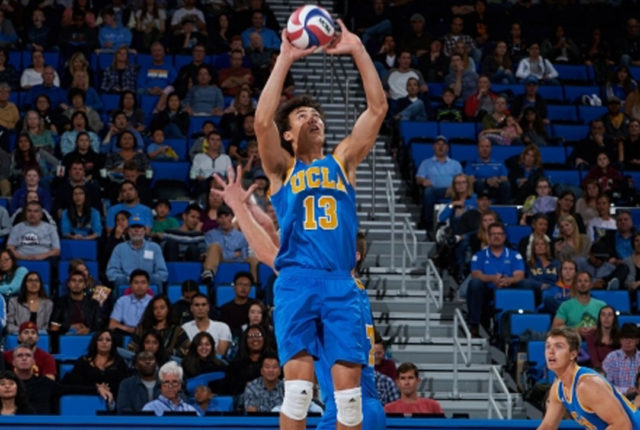
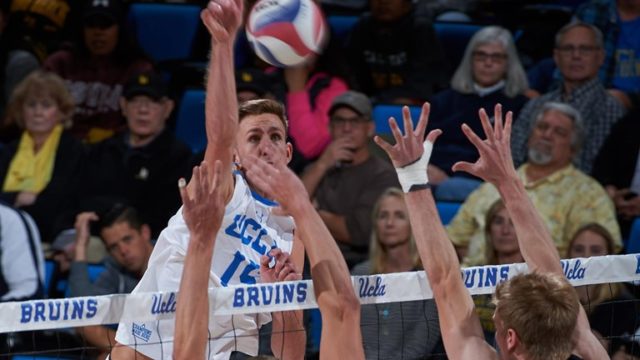
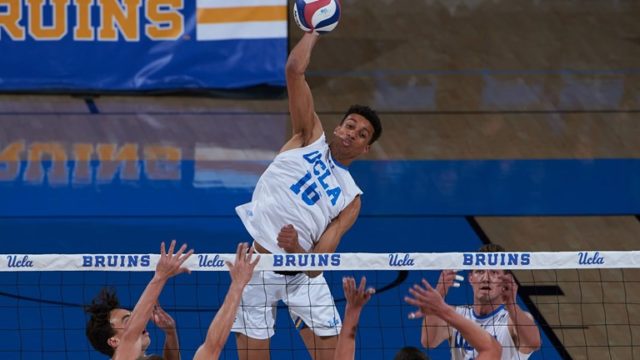
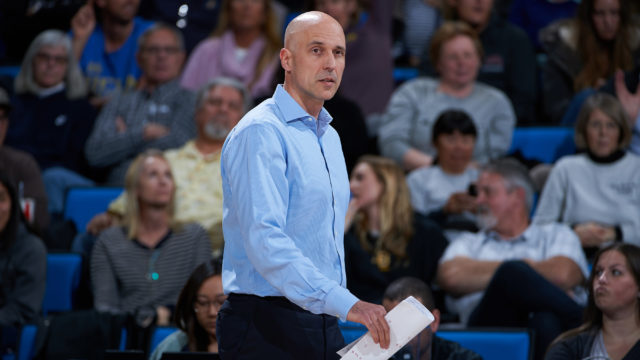
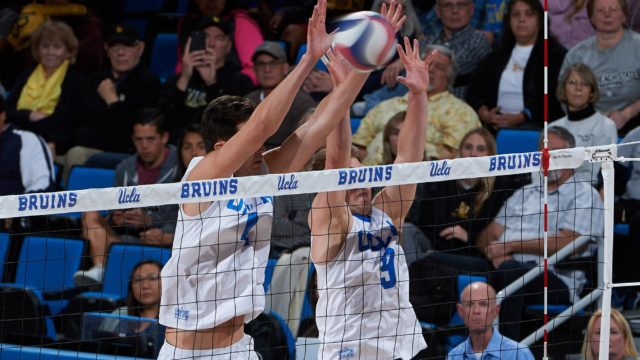
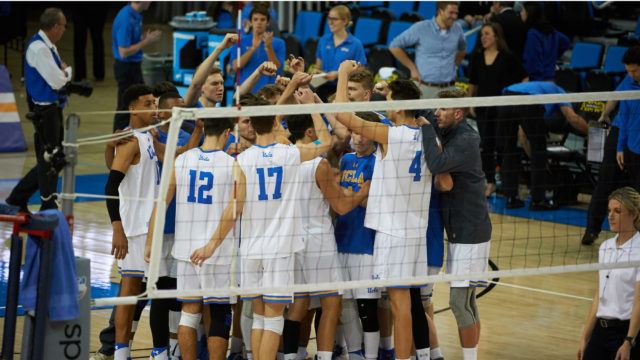
Leave a Reply